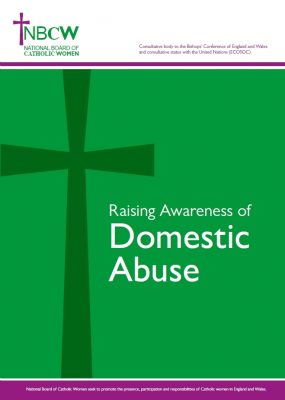
By Cian Molloy - 15 August, 2020
A new booklet aimed at raising awareness within the Catholic community of England and Wales, of domestic violence and its impact on women and children has been published by the National Board of Catholic Women (NBCW).
Commending the publication, which is available for download here, Abbot Hugh Allan, O. Praem, says the publication is timely because of the additional strains that COVID-19 is putting on relationships.
“At a time when the crisis around the pandemic has seen an increase in cases of domestic abuse, this timely booklet from the NBCW is an excellent resource for all of us,” the abbot said, speaking on behalf of the English and Welsh Bishops’ Conference.
“The masterpiece of creation is a human being. This great dignity is the birth right of everyone. The welfare and safety of all God’s children is a something every Christian has a responsibility to act upon. No one should ever live in fear of violence, or of any kind of abuse.”
There is no real Irish equivalent of the NBCW, which is a consultative body to the Bishops’ Conference of England and Wales. The board, which allows Catholic women to come together to share their views at diocesan and national level, was formed in 1939, at the suggestion of Cardinal Arthur Hinsley, from the amalgamation of three other Church organisations: the Catholic Women’s League, the Union of Catholic Mothers and the Catholic Girls Association.
The 32-page booklet is, of course, primarily focused on UK needs and supports, but much of its information can be universally applied.
Key points to remember, according to the NBCW, include:

In the booklet, the NBCW refers to recent Church documents that have denounced domestic abuse as a sin and that have advised abused spouses to seek help and to leave abusive situations.
In particular they cite, Pope Francis’s apostolic exhortation Amoris Laetitia (‘the Joy of Love’) which states ‘The verbal, physical and sexual violence that women endure in some marriages contradicts the very nature of the conjugal union’ and ‘Every form of sexual submission must be clearly rejected. This includes all improper interpretations of the passage to the Ephesians where Paul tells women “to be subject to your husbands”’.
In terms of actions that anybody can take to help, the NBCW suggests: Raising money for local and national domestic abuse charities so that they can help more victims and survivors; If you witness a woman being harassed or attacked, and if it is safe, try to do something to help her. If you do not feel you are able to, or it is not appropriate, then phone the police; If you overhear a woman being attacked in her home, do something. If you do not feel able to intervene yourself, then phone the police; Ensure that advice leaflets are available and posters on display in parish facilities, schools, retreat houses, pastoral centres etc; If you see violence against women trivialised or sensationalised on TV, in advertising, at the cinema or in video games, complain.